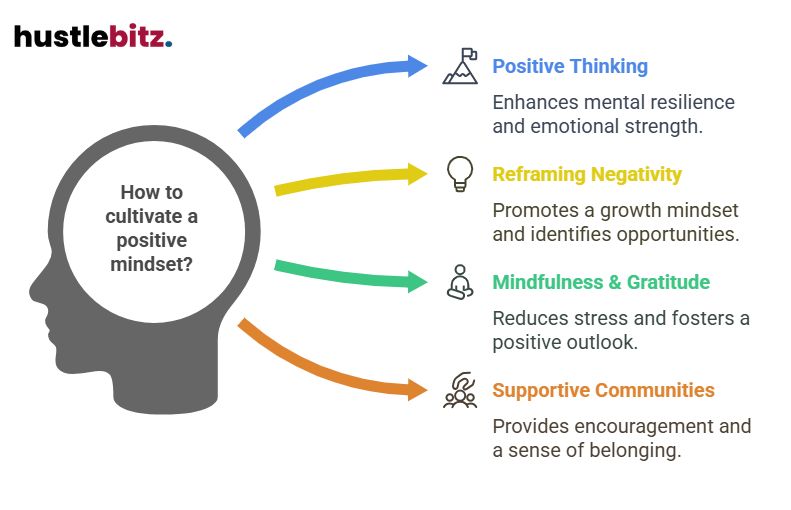Positive thinking serves as a vital mechanism for overcoming life’s challenges. It enhances mental well-being, fostering emotional resilience and healthier behaviors. This optimistic mindset allows individuals to reframe negative situations, recognizing them as opportunities for growth. By adopting proactive coping strategies and focusing on personal strengths, one can effectively manage stress and build resilience. Utilizing techniques such as visualization and gratitude practices further promotes positivity. Additionally, surrounding oneself with supportive communities reinforces confidence and motivation. Embracing these concepts can profoundly change your outlook, revealing even more effective strategies for navigating adversity.
Key Takeaways
- Positive thinking enhances mental resilience, allowing individuals to navigate life’s challenges with increased emotional strength and clarity.
- Reframing negative situations promotes a growth mindset, helping to identify opportunities within adversity.
- Techniques like mindfulness and gratitude journaling foster a positive outlook and reduce stress, promoting overall well-being.
- Supportive communities and positive influences provide encouragement, enhancing motivation and a sense of belonging during tough times.
- Engaging in joyful activities and creating cheerful environments uplift mood and contribute to a more satisfying life experience.

Benefits of a Positive Thinking
Positive thinking serves as a powerful catalyst for enhancing mental well-being, fostering resilience against stress, anxiety, and depression.
Individuals who engage in self-affirmation practices often find that they can cultivate an optimistic mindset, which is essential for overcoming self-doubt. This positive outlook not only bolsters emotional resilience but also enhances emotional intelligence, allowing individuals to better understand and manage their feelings and those of others.
Moreover, the benefits of positive thinking extend to improved physical health. Research has shown that individuals with a positive mindset are more likely to adopt healthier behaviors and engage in stress reduction strategies, leading to lower levels of stress hormones and an overall sense of vitality.
This holistic approach to well-being also correlates with boosting motivation levels, as positivity can ignite a drive to pursue goals and embrace challenges.
Fostering creativity is another significant benefit associated with a positive mindset. When one adopts a positive outlook, the mind becomes more open to new ideas and innovative solutions.
Furthermore, positive thinking nurtures relationships by promoting a sense of connection and understanding in interpersonal interactions, reinforcing the importance of support networks during difficult times.
Reframing Negative Situations

Reframing negative situations involves shifting one’s perspective to view challenges as opportunities for growth and learning. This cognitive restructuring is essential for cultivating an optimistic outlook, enabling individuals to transform negativity into constructive thinking. By engaging in challenge reframing, one can achieve a significant mindset shift that fosters emotional resilience in the face of adversity.
When confronted with difficulties, adopting a problem-solving mindset is crucial. This approach encourages individuals to reinterpret adverse experiences, not merely as obstacles but as valuable lessons. The process of adversity reinterpretation allows for a deeper understanding of the situation, turning potential despair into motivation for improvement. Each challenge becomes an opportunity to expand one’s skill set and enhance personal development.
A perspective change is vital in this process; it helps individuals break free from limiting beliefs that often accompany negative situations. By recognizing the potential benefits of these experiences, individuals can engage in a negativity transformation that empowers them.
Moreover, reframing involves actively seeking the silver lining in every situation. This proactive stance encourages a more positive emotional state, reinforcing the belief that setbacks can lead to greater achievements.
Ultimately, the ability to reframe negative situations not only enhances one’s capacity to cope with challenges but also promotes a healthier, more balanced approach to life. Embracing this technique can lead to significant improvements in overall mental well-being and personal growth.
Building Resilience Through Positivity

Cultivating resilience is crucial for navigating life’s challenges, and adopting a positive mindset plays a pivotal role in this process. Resilience building often begins with mindset shifts that foster emotional strength and adaptive thinking. By focusing on optimism practices and the development of a growth mindset, individuals can better equip themselves to face adversity with confidence.
Key strategies for enhancing resilience through positivity include:
- Coping Strategies: Implementing effective coping strategies can significantly improve one’s ability to manage stress and maintain a positive outlook during tough times.
- Self Empowerment: Recognizing personal strengths and capabilities empowers individuals to tackle challenges head-on, reinforcing their resilience.
- Stress Management: Engaging in proactive stress management techniques, such as mindfulness and relaxation exercises, helps cultivate a more balanced emotional state.
- Perseverance: Maintaining a commitment to persevere despite setbacks encourages a resilient attitude and reinforces a belief in eventual success.
These elements contribute to a holistic approach to resilience building, allowing individuals to develop coping mechanisms that not only combat stress but also promote well-being.
Techniques for Positive Thinking

Developing effective techniques for positive thinking can significantly enhance resilience and empower individuals to navigate life’s challenges with greater ease and optimism. Implementing a variety of strategies can foster a positive mindset and contribute to overall well-being.
One practical approach is the use of affirmations practice, where individuals regularly repeat positive statements to reinforce self-belief. Visualization techniques can also be beneficial, allowing individuals to imagine successful outcomes, thereby reducing anxiety related to challenges. Incorporating mindfulness exercises promotes present-moment awareness, helping to alleviate stress and cultivate a positive outlook.
Another effective method is optimistic journaling, which encourages individuals to document positive experiences and reflections, ultimately shifting focus away from negativity. Self-compassion strategies are essential, enabling individuals to treat themselves with kindness in times of struggle. Engaging in positive self-talk can counteract negative thoughts and bolster confidence.
To further enhance positive thinking, individuals can utilize goal setting methods that encourage achievable targets, paired with motivational quotes to inspire action. Consistent daily reflections can serve as a tool for self-assessment, promoting gratitude and recognition of personal growth.
| Technique | Description |
| Affirmations Practice | Repeating positive statements to build self-belief |
| Visualization Techniques | Imagining positive outcomes to reduce anxiety |
| Mindfulness Exercises | Practicing present-moment awareness for stress relief |
Employing these techniques can transform one’s approach to challenges, fostering a resilient and optimistic mindset.
The Role of Gratitude

Gratitude serves as a powerful tool for enhancing mental well-being and fostering a positive outlook, particularly in the face of life’s challenges. By cultivating a thankful mindset, individuals can shift their focus from difficulties to the positive aspects of their lives. This shift not only improves emotional resilience but also encourages a deeper appreciation for everyday experiences.
Engaging in practices such as gratitude journaling and appreciation exercises allows people to actively recognize and document moments of thankfulness. These activities serve as gratitude reminders, reinforcing positive thoughts and emotions.
Consider incorporating the following strategies into your daily routine:
- Gratitude meditation: Spend a few minutes each day reflecting on what you are grateful for, fostering a sense of peace and contentment.
- Daily affirmations: Use positive statements to affirm your appreciation for both yourself and others, enhancing self-worth and connection.
- Gratitude visuals: Create a collage or display images that represent things you are thankful for, providing a visual reminder of positivity.
- Community service: Engaging in acts of kindness not only helps others but also enriches your own sense of purpose and gratitude.
Through personal reflection and expressing thanks, individuals can develop a more profound understanding of their lives and their relationships. By integrating these practices, one can effectively navigate challenges with resilience, paving the way for a more fulfilling existence.
Surrounding Yourself With Positivity
Surrounding oneself with positive influences, whether through supportive relationships or uplifting environments, plays a crucial role in enhancing mental resilience and overall well-being. The concept of positive environments extends beyond mere physical spaces; it encompasses the emotional and psychological influences that shape our daily experiences. Engaging with uplifting relationships, characterized by affirming interactions and mutual encouragement, fosters a sense of belonging that can alleviate stress and boost confidence.
Supportive communities are vital, as they provide a network of encouragement during challenging times. These communities often promote optimistic media and motivational spaces that inspire individuals to pursue their goals, reinforcing a positive mindset. Participating in joyful activities, such as group outings or community events, can further enhance one’s emotional state, allowing individuals to connect with like-minded peers who share similar values and aspirations.
In addition to interpersonal connections, immersing oneself in inspiring literature can be a powerful tool for fostering positivity. Books and articles that promote resilience and hope can serve as guiding lights during difficult periods. Furthermore, cheerful surroundings, whether at work or home, can significantly influence mood and productivity.
Final Thoughts
Positive thinking is a transformative approach to overcoming life’s challenges. By fostering mental resilience and emotional strength, it empowers individuals to navigate difficulties with clarity and purpose. Embracing techniques such as reframing negative situations, practicing gratitude, and engaging in mindfulness can significantly reduce stress and enhance overall well-being. Additionally, surrounding oneself with supportive communities and indulging in joyful activities can uplift your mood and reinforce motivation. The holistic benefits of a positive mindset extend beyond emotional health, improving physical well-being and nurturing creativity. By integrating these strategies into your daily life, you can cultivate a more optimistic outlook, effectively manage stress, and unlock your full potential for personal growth and success.




